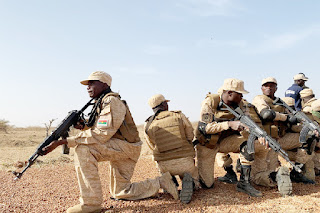Burkina Faso Massacre Exposes Horrific Toll, Prompting Global Outcry
A recent report has uncovered a disturbing account of violence and destruction in Burkina Faso. According to the findings, the country’s military executed at least 223 civilians, including 56 children, in two towns on February 25, 2024. This revelation uncovered one of the deadliest incidents of state-sanctioned brutality since 2015, shedding light on a grave violation of human rights that has shocked the international community.
The killings, which occurred in the towns of Nondin and Soro in the Thiou province of Yatenga region, appear to have been part of a broader military campaign targeting civilians suspected of collaborating with Islamist armed groups. The victims, including women and children, were allegedly singled out due to their perceived ties to the insurgency. This marks an alarming escalation in the conflict, as the military’s response has shifted from targeting armed combatants to indiscriminately attacking civilian populations.
In the wake of these atrocities, an urgent call has been issued for Burkinabè authorities to conduct a thorough and impartial investigation. International oversight from bodies like the African Union and United Nations is considered crucial to ensure the probe’s integrity and fairness. Given repeated failures to prevent and address such crimes, outside support is viewed as essential to holding perpetrators accountable and providing justice for victims and their families.
The killings come against the backdrop of a widening conflict in Burkina Faso, where government forces are engaged in a protracted battle against Islamist armed groups such as JNIM and ISGS. These organizations have launched multiple attacks on military and civilian targets, resulting in tremendous loss of life and widespread displacement. The massacre serves as a stark reminder of the urgent need for a comprehensive approach to addressing the root causes of the conflict and protecting civilian populations from further harm.
The international community has responded with shock, condemning the atrocities and calling for swift action. Efforts are also underway to provide aid to affected communities and support initiatives rebuilding infrastructure and livelihoods. Moving forward, challenges remain in tackling the fundamental drivers of the conflict in Burkina Faso. A holistic approach addressing social, economic, and political grievances is critical to achieving lasting peace and stability in the region.



Comments
Post a Comment